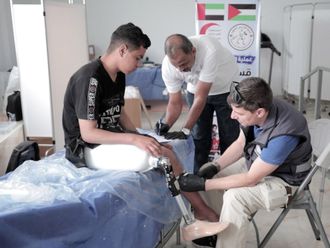
The Covid-19 pandemic has been challenging for everyone this past year, but there was light at the end of the tunnel with the arrival of nationwide vaccine programmes. However, there were also concerns that this game-changing preventive measure might pose a risk to people with serious allergies..
In the UK, regulators had banned those with a history of severe allergic reactions to medicines, food and vaccines from taking the Pfizer/BioNtech vaccine after two reports of life-threatening responses.
“According to the US Centers for Disease Control and Prevention, people should get vaccinated even if they have a history of severe allergic reactions unrelated to vaccines or injectable medications, such as food, pet, venom, environmental or latex allergies,” explains Dr Marilyn R. Karam, MD, Consultant Allergist and Immunologist at American Hospital Dubai.
According to the US Centers for Disease Control and Prevention, people should get vaccinated even if they have a history of severe allergic reactions unrelated to vaccines or injectable medications, such as food, pet, venom, environmental or latex allergies.
In people with serious allergies, strong immune-system-suppressing steroids at high dosage for prolonged periods could compromise immune response, increasing risk of Covid-19 infection.
“If these dosages can be safely stopped, waiting two weeks before vaccination may be a reasonable approach,” says Dr Ram Shukla, Specialist Physician of Infectious Diseases at NMC Royal Hospital, Sharjah. “If not, do not delay the vaccine as the risks associated with general Covid-19 infection outweigh the potential risk of impaired vaccine immunogenic response, which may occur due to steroids.”
However, it is allergies to vaccines themselves that pose the most significant concern.
“If you had an immediate allergic reaction i.e. a reaction that happens within four hours of getting vaccinated, or a severe one — also known as anaphylaxis — after the first shot of a Covid-19 vaccine, you should not get a second shot of that vaccine,” says Dr George Cherian, Specialist in Internal Medicine at Aster Clinic, Qusais.
If you had an immediate allergic reaction i.e. a reaction that happens within four hours of getting vaccinated, or a severe one — also known as anaphylaxis — after the first shot of a Covid-19 vaccine, you should not get a second shot of that vaccine.
Range of reactions
There can be a range of allergic reactions, but swollen rashes that develop a few days to more than a week after the vaccine at the place where the dose is given, called a Covid Arm, can be treated using antihistamines and painkillers and do not mean that the vaccination course cannot be completed, explains Dr Cherian.
Dubai Health Authority excludes those with history of severe allergic reactions or hypersensitivity to vaccines, specific Covid-19 vaccine or its components, and anyone suffering immediate allergies to the first dose from continuing with the programme.
“An individual with history of severe allergic reactions (anaphylaxis) to vaccines or any injectable medication should be assessed for risk, but overall, having mild to moderate allergies doesn’t exclude you from getting the vaccine,” adds Dr Shukla.
An individual with history of severe allergic reactions (anaphylaxis) to vaccines or any injectable medication should be assessed for risk, but overall, having mild to moderate allergies doesn’t exclude you from getting the vaccine.
Are these common?
So far, such instances of severe allergy to vaccines have been very rare. According to one study by the Medicines and Healthcare Regulatory Agency, UK, as little as 455 of almost 20 million administered doses of the Oxford-Astrazeneca vaccine was linked to anaphylaxis-related life-threatening reactions.
“Those who have had severe allergic reactions or any type of immediate allergic reactions to a vaccine or injectable therapy should be monitored for at least 30 minutes after getting the vaccine,” says Dr Abdalkarim Nassar, Specialist Pulmonologist at Burjeel Specialty Hospital, Sharjah. “All other people should be monitored for at least 15 minutes.”
A CDC report showed that a majority of life-threatening allergic reactions took place within 15 minutes; all were treated successfully.
In high-risk patients, Covid-19 vaccines should be administered in a healthcare setting where anaphylaxis can be treated immediately, adds Dr Karam.
“Overall, these risks are negligible considering the boon of the vaccine, that is, it offers protection against Covid-19,” says Dr Nassar.
— The writer is an intern with Gulf News Commercial Publishing












